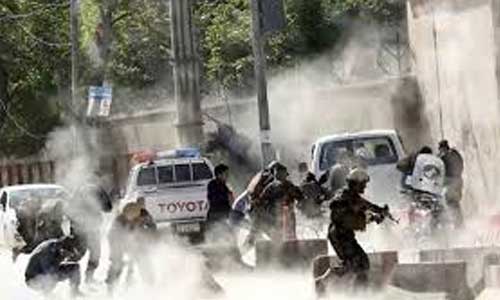With the intra-Afghan peace talks in limbo in Doha, Qatar, Afghanistan has been experiencing an unprecedented wave of insecurity. Afghan security forces have been bearing the actual brunt of the situation, while the people in general are becoming the victim of overflow of violence in different parts of the country. The situation is really concerning for the Kabul administration, that has been striving to sustain its fading authority with an uncertain future ahead. Neither, it has been able to convince or pressurize Taliban for a ceasefire nor it has shown tangible results in persuading the discontented political leaders who favor the republican system in the country. Such incapacity to control the situation will ultimately and ill-fatedly multiply the security challenges for the Afghan National Defense and Security Forces (ANDSF), who are already under immense pressure as the security incidents are on an upward trajectory despite the start of winter.
Only in the month of November, there have been a number of incidents around the country that show that the insurgents mean business. On Sunday (Nov. 29, 2020) in PD-3 of Ghazni City, a lethal suicide attack on a public protection unit killed or injured more than 50 people, mostly security personnel. Though the numbers given by different sources differ, some agree that at least 31 people were killed while more than 24 others were wounded in an attack that reportedly used a Humvee full of explosives. If a Humvee was actually used in the attack, it points at a serious intelligence and security breach. First, the possession of a Humvee by the insurgents shows that they have access to heavy-duty military accessories, and second, they are able to penetrate the security check-points in major cities of the country without much resistance. If such is the case, the defenseless civilians are left with no optimism about their security.
Along with the security check-points and installations, high-profile security personnel also face severe security challenges. In a clash in the western Herat province on Monday (Nov. 30, 2020) morning, the acting police chief of Obe district, Abdul Ahad Walizada, was killed, while another policeman was injured. Meanwhile, on Sunday night (Nov. 29, 2020), the Afghan Army’s 3rd Infantry Brigade head, Abdul Basir Nuristani was allegedly killed in a Taliban mortar attack, while 11 soldiers were injured.
These attacks came after the twin Improvised Explosive Device (IED) explosions in the restful Bamyan City on Tuesday (Nov. 24, 2020) that resulted in the death of 17 people and injury to around 50 others. The attack broke the myth that there are certain peaceful cities in the country. It also raises concerns about the plight of Hazaras in Afghanistan who have been facing the worst consequences of insecurity, whether it was the civil war in the country or the present surge in violence.
Meanwhile, 23 rockets were fired in the capital Kabul on Nov. 21, 2020, resulting in the death of 8 civilians, while Kabul University in the heart of the city was attacked by insurgents, leading to the death of around 22 people with injury to an equal number.
Surprisingly, the above-mentioned attacks, particularly, the first three on security forces, are not claimed by the Taliban. National Directorate of Security (NDS) says that it is a new tactic opted by Taliban not to claim responsibility of the attacks on public places. However, a more important question than the claim of the responsibility is the breach of security that must be responded to. Persistent attacks on high-profile security personnel and the public places raise doubts about the performance of the relevant authorities.
Moreover, there are serious concerns about the follow-up of major security incidents even in the capital Kabul.
The lethal attacks on hospital, educational institutions and mosques in west of Kabul, before the above-mentioned attacks, were never pursued properly.
The investigations for these attacks were never carried out in a professional manner, as the security apparatus in the country lacks the required capacity. Moreover, the follow-up of the Kabul University attack was not satisfactory either. First, the security personnel at the site were held responsible, later they were said not to be the culprits, only to be blamed again the next day. Daesh (ISIS-Khorasan) that claimed responsibility for the attacks has remained mostly untouched or unapproachable by the security forces. Such incapacity to pursue serious incidents of insecurity raises questions about the delivery of justice to the people and the legitimacy of the Kabul administration as a whole, further complicating the security atmosphere in the country.
Though it is a fact that the answer to the question of rising insecurity in Afghanistan ultimately lies in a negotiated settlement with the Taliban through an intra-Afghan peace process; in the short-run, it is vital that Afghan security apparatus must maintain a certain level of authority and legitimacy, and must ensure the people that it has the capacity to protect their lives and deliver justice to them. Otherwise, the Afghan republican team in intra-Afghan talks will face difficult conditions for establishing peace in the country.
Home » Opinion » Burgeoning Insecurity in Afghanistan
Burgeoning Insecurity in Afghanistan
| Sajjad Aasim

